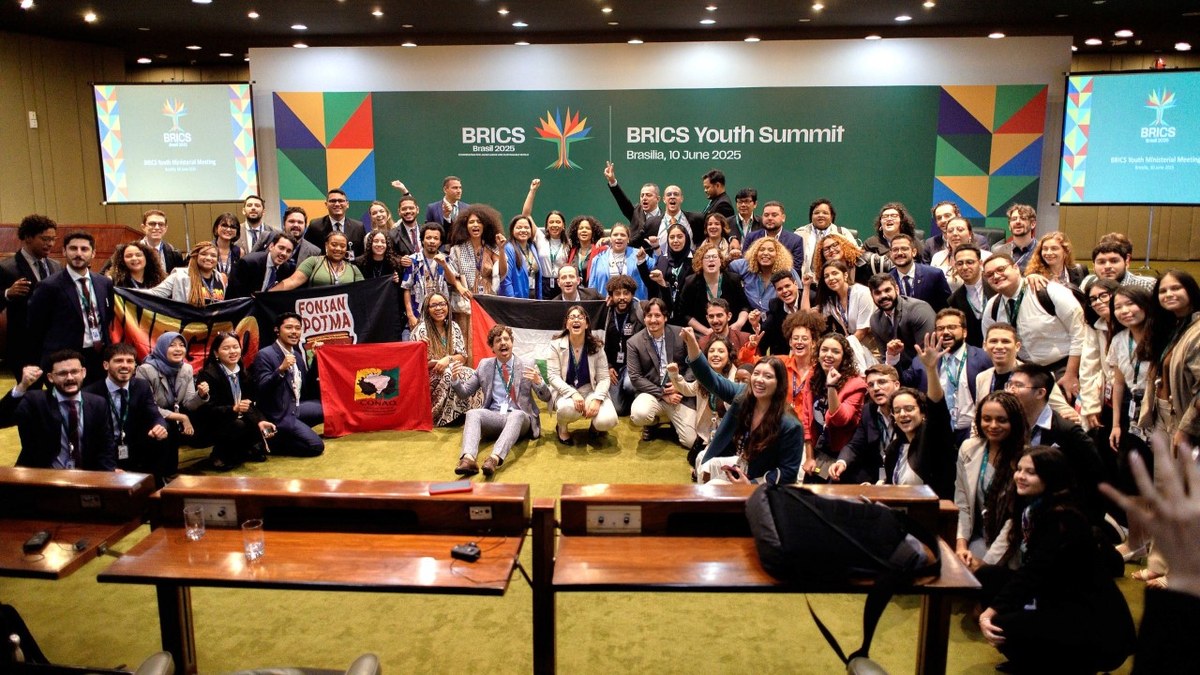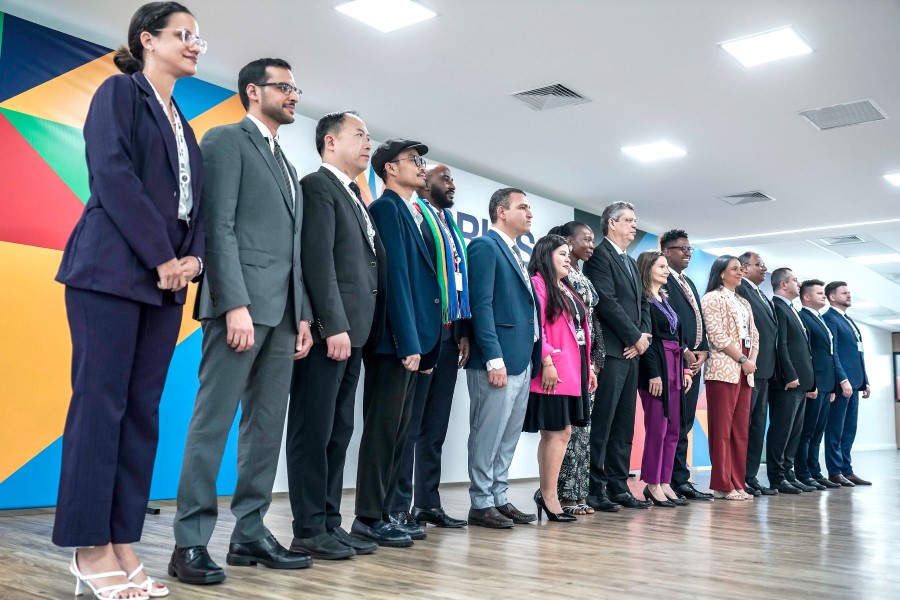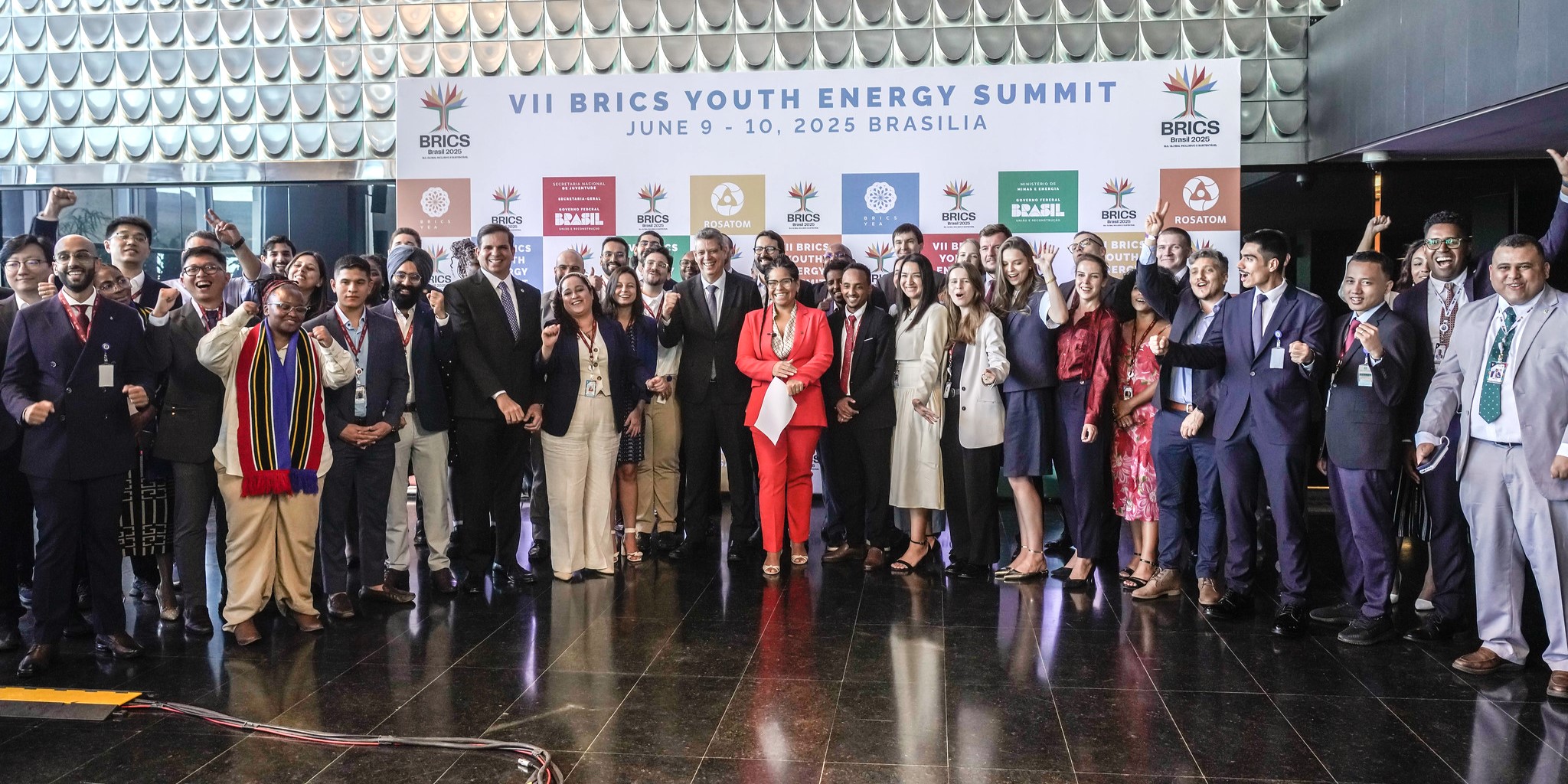BRICS youth push forward cooperation agenda in one of the year’s largest gatherings
At the Summit, with participation from member and partner countries, young delegates signed a Memorandum, proposed a geopolitical approach that considers generational inclusion, and reaffirmed a shared agenda centered on sovereignty, diversity, and innovation

By Franciéli Barcellos de Moraes / BRICS Brasil
The renewal of multilateralism will require more than structural reforms—such as a strengthened BRICS agenda. It will also demand a profound generational shift. Youth must be granted more than a symbolic seat at the table; they must have a real vote in international decision-making processes, on issues that go beyond the traditional youth portfolio of sports, diversity, or culture. That conviction brought together voices from across the Global South in multiple languages, as BRICS youth convened in Brasília on June 9 and 10 for the 11th BRICS Youth Summit— the first since the bloc's expansion and one of the largest BRICS gatherings of the year.
“We in the Global South have the highest percentage of young people, in absolute terms, anywhere in the world. This means that the future of the planet—being built in the present—must be shaped by the hands of young people, especially those from the Global South,” said Ronald Sorriso, National Youth Secretary at the Office of the Presidency. “BRICS represents these nations and can, through its youth’s inventiveness, creativity, and spirit of nonconformity, promote a new way of seeing things—and of seeing the world.”
Over the course of two days, discussions took place at both the BRICS Brasil headquarters and the Itamaraty Palace. Following the logic of progressive consensus, delegates worked toward institutional integration of Global South youth—culminating in the signing of the “Memorandum of Understanding on Cooperation in Youth Affairs.” The document focuses on key areas such as climate action, support for humanitarian cooperation, the formation of a BRICS-wide youth policy network, and the development of a broader approach within other multilateral frameworks related to youth. It also calls for the creation of a working group to establish measurable indicators for assessing the impact of the Memorandum’s goals.
Since bringing together authorities from different countries in a single space is a unique opportunity to address high-level issues, the Summit also served as a venue for bilateral meetings among national youth representatives.

Member and partner countries in sync
By recognizing and encouraging the participation of its youth, BRICS fosters a collective identity rooted in shared challenges and collective strength. This was a common understanding among the countries taking part in the Summit.
Debora John, from Nigeria’s Federal Ministry of Youth Development, highlighted this point. “Our uniqueness and diversity as the Global South are deeply rich and hold immense potential. We need to talk about cognitive sovereignty. Our role is to look inward—at what we have and what we can improve—to strengthen fields like education and innovation. Because our uniqueness is valuable,” she said, adding that young people must embrace challenges and take an active interest in governance, even though many still see that space as reserved for older generations.
Nitesh Mishra, from India’s Ministry of Youth Affairs and Sports, echoed this view: “Young people are the ones who will shape the future. When we talk about the Global South, youth realize they face the same problems—and it is they who will craft the solutions.”
"Free, free, Palestine"
The ongoing crisis in Palestine was another defining theme of the Summit’s discussions. Delegates voiced strong support for the Brazilian presidency’s position on the issue. The meeting came as Brazil’s Ministry of Foreign Affairs continued to monitor Israel’s actions following the Israeli navy’s interception of the Madleen, a vessel carrying basic humanitarian aid to Gaza.
At the most recent BRICS Foreign Ministers’ Meeting in May, Brazilian Foreign Minister Mauro Vieira had already condemned Israel’s actions. “The devastating situation in the Occupied Palestinian Territories remains a source of deep concern. The resumption of Israeli bombing in Gaza and the continued obstruction of humanitarian aid are unacceptable. [...] It is essential to ensure the full withdrawal of Israeli forces from Gaza, the release of all hostages and detainees, and the unrestricted entry of humanitarian assistance,” said the minister, reiterating Brasil’s support for the creation of a viable, independent Palestinian state.
“We can see that the situation in Palestine is supported by hegemonies that have been in power for decades. BRICS is increasingly seen as a counterweight to that hegemony. And that role isn’t just about challenging economic dominance—it’s also about confronting political hegemony, which continues to ignore or outright deny existing treaties and agreements. What we’re saying here, as young delegates, is very clear: we will not tolerate that,” said Maynara Nafe, a BRICS Youth Summit delegate and Institutional Relations Secretary at the Palestinian Arab Federation of Brasil (FEPAL).
The topic is also expected to feature in the agenda of the upcoming BRICS Leaders’ Summit, to be held next month in Rio de Janeiro.

Beyond the Summit
Grounded in the understanding that the active participation of young people in BRICS dynamics is a driving force of innovation—renewing political debate and enhancing the bloc’s legitimacy by making it more representative, dynamic, and better equipped to address emerging global challenges—Brasil’s National Youth Secretariat and the National Youth Council promoted additional activities beyond the Summit itself.
On Monday, June 9, the same day as the Summit’s opening, the 7th BRICS Youth Energy Summit took place, bringing together young policy leaders and energy professionals from across the bloc. Discussions focused on topics such as sustainable fuels for climate adaptation, financing for just energy transitions, energy poverty, and the development of low-carbon energy systems. The outcomes will feed into the 2025 BRICS Youth Energy Outlook, to be formally presented at COP30 in November.
Earlier in May, the Thematic Regional Seminars drew more than 2,000 participants to five virtual sessions — one for each region of Brasil — focused on sustainability, healthcare, sports, technology, and education. The initiative pursued three goals: electing regional delegates for the Summit, strengthening the Brazilian presidency’s priority of social participation under the People-to-People (P2P) pillar, and enriching the drafting of the Memorandum signed on Tuesday, June 10.
English version by: Judas Tadeu de Azevedo Neto (POET/UFC)
Proofreading by: Luana Ferreira de Freitas (POET/UFC)